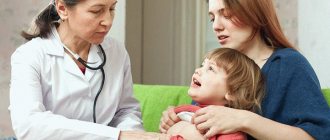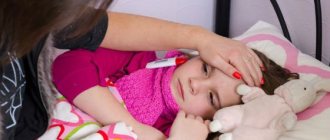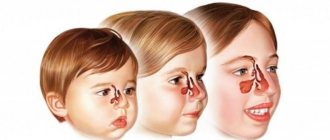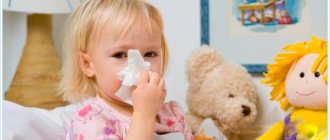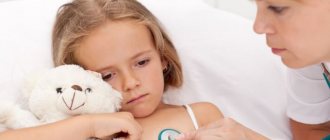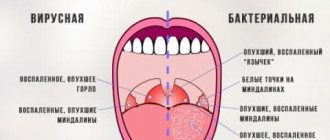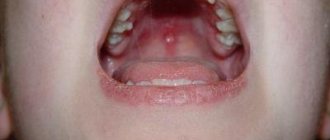Among all the infections that children suffer from, intestinal diseases are in second place in frequency - after ARVI. In general, intestinal infections are quite common among the entire population, but such “popularity” among children has its own logical explanations.
Infection with intestinal infections occurs through the fecal-oral route, that is, through the mouth. And the mediators can be dirty hands, unwashed fruits, non-compliance with hygiene standards. You can't keep an eye on your child here. In general, children under the age of seven are most susceptible to intestinal infections. After all, children's immunity to pathogenic bacteria and viruses is very weak compared to adults. This is especially true for newborns.
Description of the disease
Intestinal infection refers to diseases of the gastrointestinal tract caused by bacterial, viral or fungal agents.
The most common pathogens are: enteroviruses, rotaviruses, salmonella, staphylococcus, dysentery bacillus, etc. Intestinal tract infections are widespread in childhood. In terms of incidence, they are second only to respiratory diseases. Infection, as a rule, occurs due to non-compliance by the child and his parents with the rules of personal hygiene, sharing toys and other household items with infected people, and eating unwashed vegetables and fruits. The disease can be identified by impaired bowel movements, nausea, vomiting, a sharp decrease in appetite and an increase in body temperature.
If you suspect that a child has an intestinal infection, you should immediately seek advice from a gastroenterologist. Lack of treatment can provoke the development of serious complications: septic condition, shock due to vascular paralysis due to bacterial intoxication, acute kidney failure, heart failure, etc.
Treatment
When determining treatment tactics for DCI, it is necessary to take into account the patient’s age, characteristics of the premorbid background, and the period of the disease. Initial therapy for acute intestinal infections of any etiology (viral, bacterial or combined) in children includes diet, enterosorption and rehydration therapy [27, 28].
Enterosorbents should be prescribed to all patients, regardless of the etiology and severity of the disease, at the earliest possible stage of the disease - this allows for rapid relief of diarrhea. Preference is given to synthetic and mineral enterosorbents. On average, taking enterosorbents can last 5–7 days, but early discontinuation of the drug is possible - with stable normalization of stool.
Rehydration therapy is carried out in 2 stages. At the first stage, it is necessary to compensate for losses caused by vomiting and/or loose stools, so in a fairly short period of time (6 hours) the child should receive a volume of fluid at the rate of 50–80 ml/kg of body weight. At the second stage, current losses are replenished, so rehydration is carried out more slowly, at the rate of 80–100 ml/kg of the child’s body weight over the next day. The duration of this stage may vary and depends on the condition of the individual patient. For rehydration in children, you can use ready-made glucose-salt hypoosmolar (osmolarity 245 mOsm/l) solutions, as well as drinking non-mineral water. The ratio of glucose-saline solutions and water for watery diarrhea is 1:1, for invasive diarrhea - 1:2; with severe vomiting - 2:1.
According to WHO recommendations, indications for antibacterial therapy are amebiasis, typhoid fever, dysentery, and cholera. In addition, antibiotics can be prescribed for bacterial acute intestinal infection, accompanied by symptoms of colitis (including hemorrhagic); in severe and generalized forms of the disease; for moderate forms of the disease, all children under 2 years of age, as well as patients at risk, regardless of age. For viral acute intestinal infections, accompanied by copious watery stools, antibiotic therapy is not advisable. OCI of combined etiology requires an individual approach to therapy in each specific case.
Due to the pathogenic effect of viruses and/or bacteria - causative agents of acute intestinal infections on the microbiota of the gastrointestinal tract, a significant disruption of its composition occurs, therefore, for any acute intestinal infections (in the acute period and the period of convalescence), correction of dysbiotic disorders is required using prebiotics (substances of non-microbial origin that can have a positive effect on the body by stimulating the growth or metabolic activity of normal intestinal microflora), probiotics (live microorganisms that, when used in adequate quantities, have a healing effect on the human body), synbiotics (complexes consisting of a rational combination of probiotics and prebiotics), metabiotics (structural components of probiotics) microorganisms and/or their metabolites).
One of the medicines registered in our country - metabiotics, which can be used in children from birth, including premature infants, is Hilak forte, containing metabolites of representatives of the endogenous microbiota: Lactobacillus acidophilus
,
Lactobacillus helveticus
,
E. coli
and
Streptococcus faecalis
. The drug also contains short-chain fatty acids (SCFA): acetic, propionic, butyric, isobutyric, valeric, isovaleric, caproic, isocaproic. SCFAs are involved in the metabolism of colonocytes, cell growth and differentiation, transport of epithelial cells, metabolism of lipids and carbohydrates in the liver, regulation of intestinal motility, energy production in muscles, kidneys, heart, and brain. The drug also contains lactic acid, which also has antiseptic properties.
Clinical studies have convincingly shown the effectiveness of using the drug Hilak Forte in the treatment of acute intestinal infections: there is a decrease in the duration of vomiting and diarrhea in children, relief of symptoms of intoxication, exicosis, a decrease in the risk of allergic reactions, as well as a reduction in hospital stay [29, 30]. The effectiveness of Hilak Forte in the treatment of enteritis of Salmonella etiology in children has been proven; in particular, a significant reduction in the period of Salmonella isolation compared to this indicator in patients of the control group has been revealed, as well as the absence of side effects when using Hilak Forte [31].
During the period of convalescence, the components of the drug participate in the processes of repair of damaged intestinal cells, thereby ensuring the restoration of normal gastrointestinal function, which is important primarily in the viral etiology of acute intestinal infections. Using the gas-liquid chromatography method, it was found that a 7-day course of therapy with Hilak forte contributed to the improvement of the metabolic activity of indigenous flora with a tendency to normalize the level of volatile fatty acids and their ratios without significant changes in the structure of indigenous flora [32]. The authors point out that therapy for OCI with a metabolite-type probiotic is physiological, since it regulates the symbiont relationship between the host and its microflora and helps restore the body’s colonization resistance.
Symptoms of intestinal infection
The symptoms of infectious pathology depend on the type of pathogen that has entered the child’s body and the presence of associated disorders. The most characteristic manifestations are:
- feverish condition;
- headache;
- muscle aches, weakness;
- pain in the abdominal area;
- refusal to eat food;
- nausea;
- vomit;
- diarrhea (possible presence of stool mixed with mucus).
If the child is not provided with timely assistance, the disease takes a severe course. Therefore, the main manifestations of the disease may include:
- a sharp deficiency of fluid in the body (dry skin and mucous membranes, weight loss, practically no urine);
- decreased pressure in the arteries;
- confusion;
- convulsions.
In order to prevent the development of complications, the child must be brought for examination to a specialist even when the first symptoms of an intestinal infection appear - refusal to eat, drowsiness, nausea and vomiting.
OKI: symptoms
Diarrhea (diarrhea) is the most common specific symptom of intestinal infections in children. Loose stools observed in a child more than three times a day should cause parents to suspect OKI.
Please note that breastfed infants have a higher bowel movement frequency than older children.
In addition to an increase in the frequency of stool and its liquid consistency, changes in its color may indicate an intestinal infection. For example, with viral hepatitis A, discoloration of stool is observed, and with dysentery, impurities of blood, mucus and greens may appear in it.
Vomiting is another specific sign of OCI. Even a single vomiting in a child can indicate the development of the disease.
In most cases, children with ACI have increased body temperature. Depending on the pathogen and the severity of the disease, it can reach 41 °C or remain low-grade. The child may also experience the following signs of intoxication and damage to the gastrointestinal tract - nausea, general weakness, adynamia, abdominal pain, painful urge to defecate (tenesmus).
Dehydration (dehydration), which develops as a result of diarrhea, vomiting and fever, is the main danger in acute intestinal infections in children. Correction of severe dehydration is possible only in a medical hospital, so consult a doctor immediately if you suspect your baby has an intestinal infection.
Causes of intestinal infection
Infection with intestinal infections occurs through the fecal-oral and household contact routes. Bacteria, viruses and fungi are transmitted from a sick person to a healthy person through shared objects (toys, dishes, towels, etc.). Children are the most susceptible to the disease. This is due to the following reasons:
- Children have lower acidity of gastric juice compared to adults.
- An incompletely formed immune system cannot resist pathogenic microflora.
- Children are more likely than adults to not observe the rules of personal hygiene.
- Children attending kindergartens and schools have closer contact with peers, which facilitates the process of transmission of infection.
Intestinal infection is often called the disease of dirty hands. Young children often ignore basic hygiene standards - they forget to wash their hands after using the toilet and before eating, they often pick up unwashed objects previously handled by infected peers, they play with pets, which can also be carriers of various infections, etc.
General information
The name intestinal infection refers to a whole group of diseases in which the digestive organs are damaged. There are about 30 species in total. What they have in common is that they are all caused by pathogenic microorganisms (viruses, bacteria), are acute and are characterized by the same type of symptoms.
Intestinal infections are common among people of all ages, most often occurring in children, as well as people with weakened immune systems. In terms of frequency of visits to a doctor, they rank second after ARVI.
Germs and pathogenic bacteria enter the environment through feces, saliva, and during sneezing. They remain viable on objects and products for a long time.
Diagnosis of intestinal infection
Diagnosis of intestinal infections is carried out on the basis of the clinical picture of the disease and the results of laboratory tests. The difficulty of diagnosis lies in the similarity of the manifestations of intestinal infection with some gastrointestinal diseases, for example, acute appendicitis, lactase deficiency, poisoning, etc. That is why parents should not exercise excessive independence in diagnosing and treating pathology. You should entrust the child’s health to a qualified specialist with many years of experience in gastroenterology. After a thorough examination of the child and collection of the necessary anamnesis (medical history), the doctor sends the little patient for laboratory testing:
- stool culture to determine causative bacteria and their sensitivity to antibiotics;
- bacteriological culture of vomit contents;
- general clinical blood test;
- scatological analysis of stool.
To exclude pathologies of the gastrointestinal tract, ultrasound, MRI or CT may be additionally prescribed.
How to treat?
The main treatment is to remove intestinal infestations from the body. The specifics are:
- cleansing the intestinal cavity,
- restoration of normal microflora,
- normalization of water balance by taking rehydron, albumin, hemodez (intravenously),
- taking sorbents to remove toxins and poisons,
- taking probiotics to restore microflora in the intestines,
- taking activated carbon, Smecta, Enterosgel, Polyphepan, Carbolong, as harmless drugs for adults and children.
Depending on the symptoms, the doctor will prescribe one or another medicine for the infection:
- opiates to inhibit intestinal motility,
- loperamide, trimebutine (tablets) to increase the absorption of nutrients, normalize intestinal function,
- hormonal drugs in the form of injections for diarrhea to normalize stool, relieve signs of inflammation, improve intestinal absorption,
- calcium gluconate,
- ergocalciferol, indomethacin for intestinal infections to eliminate attacks of diarrhea, improve general well-being and heart function,
- gastrolites as medicines to restore electrolyte balance, provide an astringent effect, eliminate symptoms of diarrhea,
- loperamide as an antidiarrheal agent for diarrhea by taking 2 tablets per day,
- antiseptic drugs by taking 4 capsules for 3 days
- furazolidone to eliminate the toxic effects of infection on the gastrointestinal tract.
Treatment of intestinal infection
The treatment tactics for intestinal infections directly depend on the type of causative agent of the disease, the severity and the presence of concomitant disorders in the body.
When treating pathology, doctors set themselves several tasks at once: to eliminate the onset of infection, prevent dehydration, relieve unpleasant symptoms and restore the normal functioning of the child’s body. For this purpose, the child is prescribed the following groups of medications:
- glucose-saline solutions for oral rehydration;
- antibiotics (for bacterial forms of the disease);
- antifungal drugs (for fungal infections);
- intestinal antiseptics;
- antipyretics;
- sorbents to prevent intoxication of the body.
In addition to drug therapy, parents need to provide the patient with dietary nutrition that is gentle on the child’s stomach and intestines.
Heavy foods can aggravate the condition and delay recovery. In case of an intestinal infection, it is necessary to reduce the amount of food consumed, drink plenty of water, and give preference to pureed or liquid easily digestible food. Fatty, fried, smoked and highly salted foods, fatty meats, fruits, dairy products, juices and carbonated drinks are excluded.
What is special about the treatment?
The main goal is to rinse the stomach, take medications to suppress intestinal infections and food intoxication. A diet with plenty of tannin is essential. It is recommended to drink strong tea, eat bird cherry, blueberries, and replenish the deficiency of water and salts in the body. In the first 4-6 after the onset of unpleasant symptoms, it is necessary to carry out primary rehydration to maintain fluid levels, water and electrolytes, especially if there is constant diarrhea and vomiting. You need to drink water in sips or tablespoons; in addition, you can take special solutions, drinking mineral water.
Prevention of intestinal infection
In order to prevent the development of intestinal infection, parents must adhere to the following preventive rules:
- From a very early age, develop primary personal hygiene skills in your child.
- Carefully monitor the cleanliness of the child’s hands and ensure the cleanliness of the objects surrounding the baby.
- Drink only clean water.
- Carefully process fruits and vegetables before giving them to your child.
- Regularly wet clean your home with disinfectants.
If your baby does develop an intestinal infection, you should immediately seek medical help from a specialist. Doctors at the SM-Doctor clinic for children and adolescents will help you quickly identify the disease and prescribe the necessary treatment.
Diagnostic measures and treatment
When the first signs of an intestinal infection appear, you should consult a pediatrician at the hospital, since the course of the disease is rapid. Based on the examination, epidemiological and clinical data, the doctor makes a diagnosis and, if necessary, prescribes the necessary tests.
The most important role is played by stool examination, which determines the type of pathogen and treatment. Blood cultures and additional urine and cerebrospinal fluid tests may be prescribed.
Important! When diagnosing an intestinal infection, it is important to exclude pancreatitis, acute appendicitis, biliary dyskinesia, lactase deficiency and other pathologies.
After confirming the diagnosis, the doctor prescribes comprehensive treatment, which includes:
- therapeutic nutrition;
- oral rehydration;
- systematic, etiotropic and pathogenetic therapy.
Children, according to indications, are prescribed antibiotics, intestinal antiseptics, absorbents and other medications that help cope with infection and the spread of the pathogen.
Only specialists can make a diagnosis and prescribe treatment.
Every mother should know what an intestinal infection is in a child, how it manifests itself, and what to do. If a disease is suspected, parents should be able to provide first aid to their child. If you suspect a disease, before a diagnosis is made and a doctor prescribes, you must not:
- give antiemetics and painkillers;
- do an enema, especially with warm or hot water;
- use fixatives;
- warm up your stomach with a heating pad.
All treatment actions must be prescribed by a pediatrician.
How long does it last
The duration of an intestinal infection depends on the complexity of the course. Mild forms disappear in 2-3 weeks. It is considered normal if recovery occurs no later than after 1.5 months. The disease is assigned the status of a protracted chronic infection if the symptoms bother the baby for six months or more.
What to feed a child with an intestinal infection and after
If a child is affected by an intestinal infection, special nutrition is required. In this case, the doctor prescribes diet No. 4 according to Pevzner, which must be used while the little one is being treated.
To prevent nausea and vomiting, you can eat:
- weak broths;
- slimy cereal soups;
- crackers, dried white bread;
- twisted boiled meat and fish (low-fat);
- baked apples without peel.
During the first days, while the symptoms are pronounced, the child is given only weak, light soups and broths. All dairy products, spicy, fried, smoked foods, onions, garlic, and carbonated drinks are prohibited until recovery. The baby's food volume is reduced, but the frequency of feedings is increased.
For your information. It will take about 3 months to completely restore the digestive function of the stomach.
Taking rehydration measures
In addition to proper nutrition, preventing dehydration is very important. To restore the water-salt solution, the doctor will prescribe various drugs (Regidron, Maratonic, Glucosolan).
On a note! With a mild stage of intestinal infection, according to Dr. Komarovsky, it is not necessary to treat the baby with medications. The body has enough strength to cope with bacteria and produce the required amount of antibodies. It is important to monitor your drinking regime and ensure proper nutrition.
Many rehydrating preparations are presented in powders. They are diluted in water and given to the baby to drink every 10-15 minutes. In the absence of the necessary medications, prepare a water-salt composition yourself: add 1 tbsp to 1 liter of water. l. sugar and 1 tsp. salt and soda.
Prognosis and prevention
Complete recovery of the child can only be ensured by early and timely identification of the causative agent of the disease. Severe forms of the disease lead in some cases to serious complications.
Worth remembering! After intestinal infections, children have unstable immunity.
The most effective way to prevent the development of infection is prevention
The main and effective preventive measures are:
- full compliance with the rules of personal hygiene;
- drinking water purification;
- proper storage and preparation of food;
- Before feeding, mothers need to treat their breasts, sterilize nipples and pacifiers.
All children who have been in contact with a sick baby are recommended to be placed in slight isolation, since an intestinal infection can manifest itself within 7 days.
To prevent an acute intestinal infection from causing more serious health problems for the baby, it is necessary to consult a doctor at the first symptoms and follow all his prescriptions.
